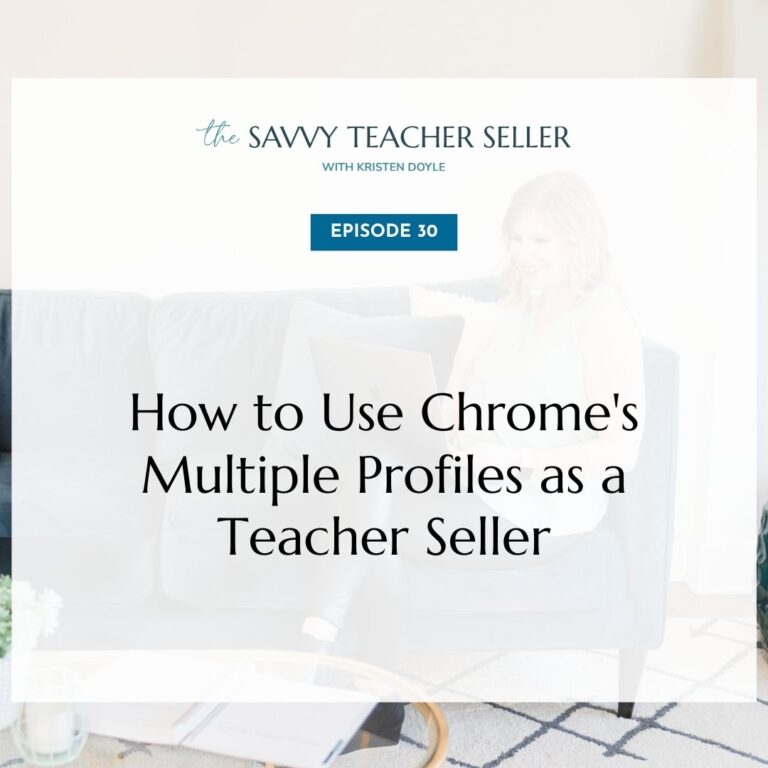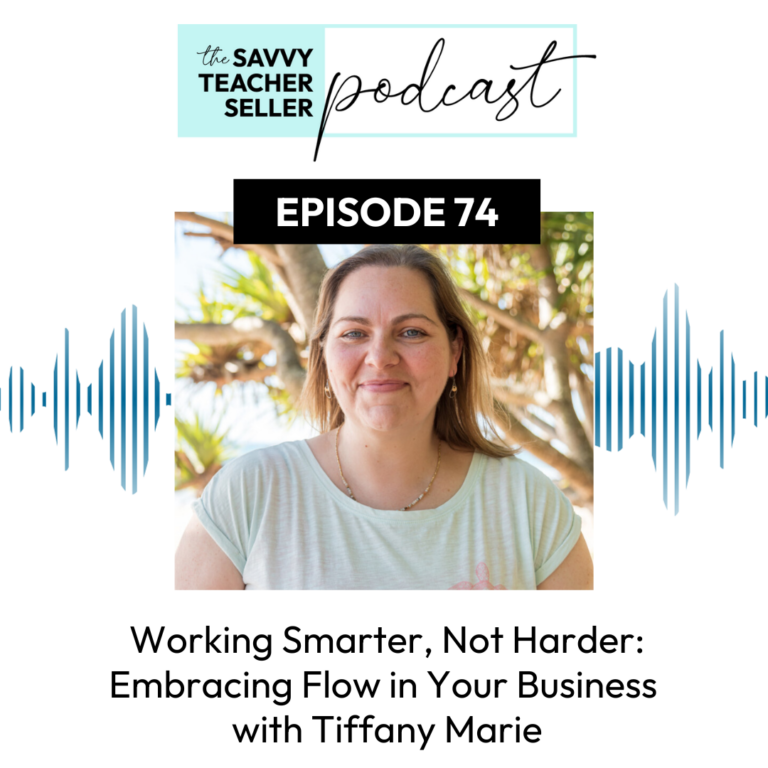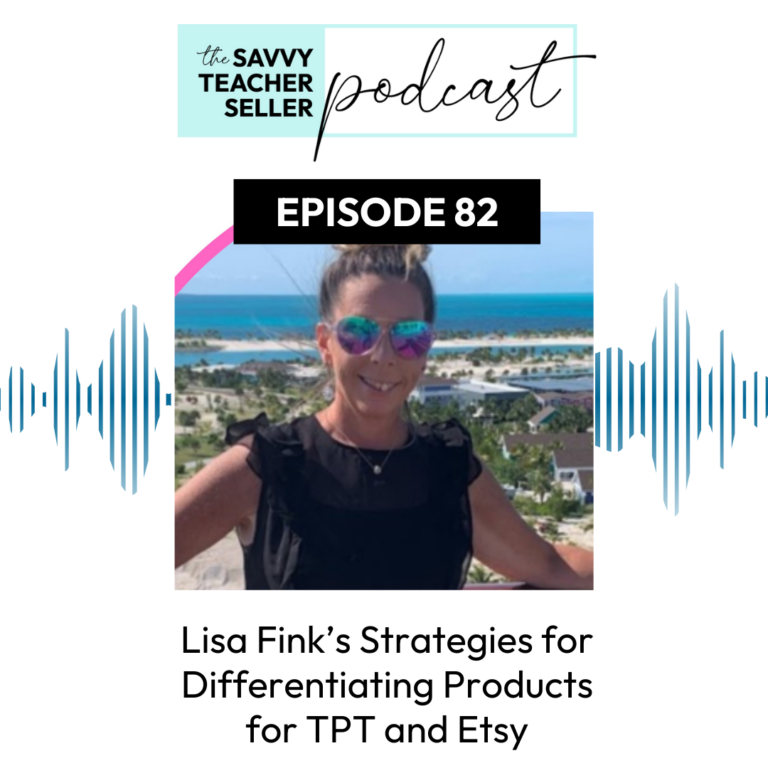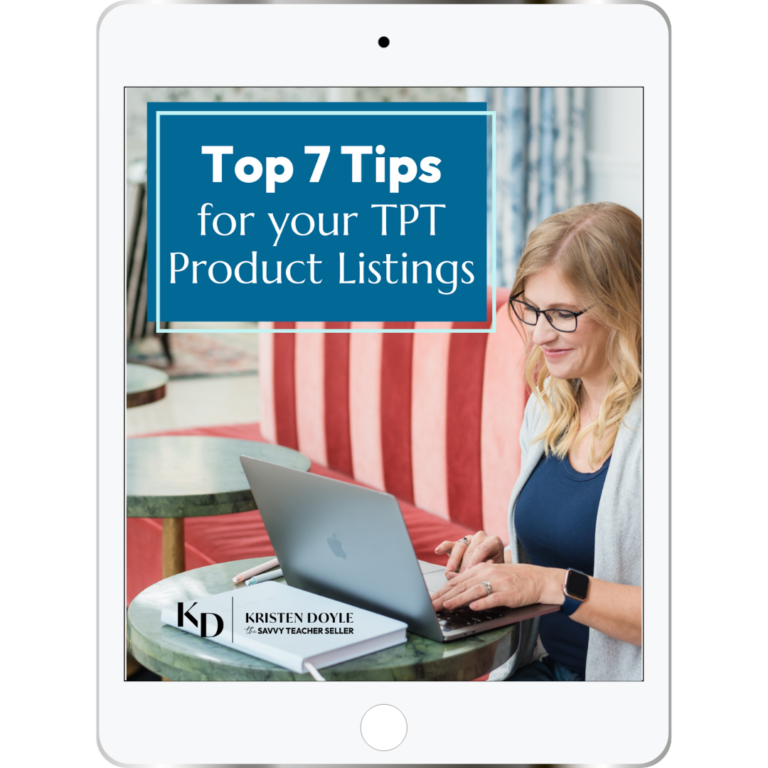0:03
Hey TPT sellers ready to see growth in your business? You’re in the right place. Welcome to the Savvy Teacher Seller. I’m Kristen Doyle and I’m here to give you no fluff tools and strategies that will really make an impact on your sales. Let’s get started y’all.
0:22
Hey, y’all, welcome to this episode of the Savvy Teacher Seller. I’m your host, Kristen Doyle. And today we are talking about a topic that every teacher seller needs to understand – the oh so fascinating world of copyright & trademark for TPT sellers. Okay, so fascinating might be a bit of a stretch. But it is something that it’s really important for us to understand at least on a basic level as we’re growing our TPT businesses.
0:53
In this episode, we will talk about the differences between copyright and trademark, why TPT isn’t more proactive about removing infringing resources from the site, and I’ll talk a little bit about how to protect your own work and protect your business as well.
1:09
Before we dive in, though, there is something I need to be really clear about, I want to remind you of something that you probably already know, I am not an attorney. So the info that I’m sharing today is based on my own research, my experiences and my understanding over the years as the TPT seller.
1:30
It is absolutely not legal advice though. I am based in the US. TPT is based in the US. So everything I know about copyright and trademark refers to US law. You may have other laws in place that apply to you if you are outside the US. But as far as TPT is concerned, US laws are what are in place. And so that’s what we’re talking about on this episode.
1:53
Intellectual property laws can be very complicated. Sometimes they vary depending on jurisdiction and specific individual circumstances. And of course, there are always changes being made to laws. So if you have a specific questions or concerns, definitely consult with an intellectual property attorney that’s in your area, so that you can get advice that is specifically tailored to your situation.
2:18
Keep in mind, this episode is meant to provide some general insights and help you understand intellectual property, but it is not specific legal guidance in any way. Okay, with that important note out of the way, let’s dive in to the world of copyright and trademark for TPT sellers, and talk about how to navigate this as a teacher seller.
2:40
We’ll start off with some definitions. So copyright is a form of protection that is given to creators of what is called an original work of authorship. This means books, movies, poems, letters, music, and yes, our TPT products, any intellectual works are copyrighted.
3:05
And typically, as soon as one of these original works is created, and it’s put into what’s referred to as a tangible form, that is, when it is copyrighted, this happens automatically. You don’t have to do anything. But you can also go on to register your copyright with the US Copyright Office.
3:27
And that is an extra kind of a voluntary extra step that you can take. You don’t have to do it for your work to be copyrighted. But you do have to register if you want to initiate a lawsuit for copyright infringement. So some people will go ahead and register copyright on major parts of their TPT store those major best sellers so that it’s protected in case they need to.
3:51
But it is not usually realistic for us to register copyrights on every single one of our resources, especially when some of them are just a couple of pages. You’d have to weigh the benefit versus the time and money that it costs to register. All right back to our definitions. Let’s talk about trademark.
4:11
Trademark is defined by the US Patent and Trademark Office as a symbol a word or phrase that is used to represent a company or a product, and it distinguishes it from others that are in the marketplace. We get trademarks, this is acquired, by using or registering that trademark in relation to specific goods or services.
4:34
So similar to copyright, you can claim a trademark and use the TM symbol without taking any sort of legal action. But in order to use the R in the little circle symbol that is a registered trademark symbol and you do have to register your trademark with the US Patent and Trademark Office.
4:52
And we’ll put links for the copyright office as well as the USPTO in the show notes for this episode for you. Registering a trademark gives it additional protection. But it is a complicated legal process. It is absolutely possible to DIY your trademark registration and there are some services out there that for a fee will handle this for you.
5:16
But I will just share with you from my own experience, I really, really hear me say really wish that I’ve had hired an attorney from the very beginning to trademark my Chalk and Apples business because I ran into some pretty big issues. And without sharing and going into detail about legal proceedings, I will just encourage you to consider the name of my TPT store, Chalk and Apples. And consider that one of those words is also a very highly protected trademark.
5:53
And that is all I will say. I wish I had had an attorney’s guidance from the very beginning. And so I would encourage you to consider what you’re the name of your businesses. And consider if it’s possible, hiring an attorney to help you through this process, so that they can guide you around ways to trademark your business or a specific product line, whatever it is that you are thinking of trademarking, ways to do that, so that you can get around any potential conflicts with other brands that want to have the same name.
6:26
Alright, that’s all I’ll say about that. Let’s talk a little bit about copyright and trademark infringement. So we’ll start with copyright infringement. The United States Copyright Office says that copyright infringement occurs when a copyrighted work is reproduced, distributed, performed publicly displayed, or made into a derivative work without the permission of the copyright owner.
6:52
Now, for us as TPT sellers, typically what we run into is school districts or teachers who might be publicly displaying, in other words, posting our copyrighted product on the internet publicly, or we might run into derivative works. And that is kind of what we’re talking about, if we’re looking at maybe another seller infringing on our copyright, that would be when they have created what’s called a derivative work.
7:18
One important distinction for us as sellers is that the work itself, the content, is what’s copyrighted. That means the text, the images, the layout of the pages, those sorts of things, but not the idea. So there are a lot of times that many of us come up with similar ideas. And I know and you know that there are sellers out there who get way too heavily inspired by our ideas. And that’s very frustrating.
7:44
But a lot of times those things are not protected by copyright. And that is unfortunate. But it is just the way it is. The actual content is what’s protected by copyright. Now, trademark infringement is defined by the US Patent and Trademark Office. And this occurs when someone uses a trademark or a confusingly similar mark.
8:06
And that’s important to keep in mind, it doesn’t have to be using someone’s actual trademark, it can also be using something that is confusingly similar to their trademark. And you use it without permission. And in a way that might cause confusion among consumers among our buyers about who is offering this product or service or whether or not this is the real one or a fake one of whatever we’re talking about.
8:33
So that’s what trademark infringement is. The major law that affects us as TPT sellers, when it comes to copyright and trademark is the Digital Millennium Copyright Act. And we’re going to call this the DMCA as a lot of people do, because that’s a long name. This is a US copyright law that was created back in 1998, to address copyright infringement, specifically on online platforms.
9:00
And this lays out a process for getting that infringing content removed when it’s posted online. This is the same law that makes it illegal to share mp3 copies of songs or to burn a DVD copy of a movie. It is the law that resulted in some of our very favorite mp3 sharing platforms from maybe our college days getting shut down. If you were in college in the early 2000s, I bet you know who I’m talking about.
9:28
The DCMA outlines a takedown procedure. And essentially, this procedure in short, is that the copyright holder notifies the platform with some specific required information. And this is the info that you see on TPTs report this resource form if you say I am the copyright holder, that’s the information that’s required by the DMCA.
9:51
And once you submit that form, then the website is required to remove the resource and contact the infringing party and then that person can either agree with you and say, oh, yeah, I was infringing my bad sorry. And in that case, the resource stays down.
10:08
Or the infringer can file a counter notice that says, no, no, I didn’t infringe on this copyright. And if they do that, then the resource goes back up. And at that point, it is up to you the copyright holder to take them to court over this copyright infringement.
10:26
And that is the process that is laid out in the DMCA. And it’s important for us to recognize as sellers that this law actually protects online service providers like TPT, because as long as they follow this process, then they aren’t held liable for the copyright infringement that might be on their site by their users.
10:48
So in short, as long as they have followed the process, you can’t sue TPT because someone else posted an infringing resource on their website. And this kind of speaks to the question of why doesn’t TPT more proactively remove those infringing resources.
11:05
It all comes down to their role as a marketplace. They host user generated content. And they don’t necessarily endorse or vet, they actually do not endorse or vet every resource. And because of this, they’re able to rely on some safe harbor provisions that are related to the DMCA to protect themselves from liability for someone on the site a seller on the site infringing on copyright.
11:21
This means that they respond to valid copyright claims following the process that’s laid out rather than proactively policing, infringing resources. And my understanding is if they start vetting resources and policing them proactively, they risk losing that safe harbor protection.
11:36
And I’m sure you can imagine it would be difficult or impossible, really, for TPT as a company to proactively monitor the hundreds of 1000s of resources that are on the site. It would be a logistical nightmare. Not to mention, there’s a high potential that they could be inaccurate, they could take down resources, where perhaps the seller has gotten permission from the copyright holder to use this.
12:24
So as frustrating as it might be for us as sellers that they aren’t more proactive, this is how TPT is able to protect themselves and stay in business. And I will just remind you, it is good for all of us for TPT to not get sued over copyright infringement so that they stay in business so that all of us stay in business.
12:44
Alright, let’s shift gears a little bit before we wrap up and talk about how we can make sure our own resources aren’t infringing, how we can protect our own businesses, so that we are not infringing on resources. First of all, do your due diligence.
12:59
Before you create something, do a little research. The USPTO database, which I will link in the show notes is the best and most reliable place to check if there’s an active trademark on the term that you want to use. There are some other sites that I see sellers refer to but I personally prefer to go straight to the source straight to the office that registers those trademarks in the first place.
13:22
So I’ll drop that link in the show notes for you. There are some big ones to be aware of in the TPT space. I will share with you Eric Carle, Dr. Seuss, Harry Potter, zones of regulation, Kagan strategies, there are so so many more.
13:39
But basically, if it is a recognizable brand, so to speak, or a recognizable educational strategy, and they have created books, they have websites, those kinds of things, then you should assume that it could be off limits, or even that it probably is off limits, at least to some degree. And you need to do your research before you create or post a product related to it.
14:06
It’s important to know that that applies whether your product is free or paid because you are a business. So everything you create even free resources are considered commercial use. Another thing to be aware of is licensing and permissions.
14:19
We are almost all using clipart or fonts or other elements that we didn’t personally create in our resources. So make sure that you always read the licensing agreements or the Terms of Use carefully and that you are following those so that you don’t get in any trouble there.
14:35
Another thing to do is just prioritize creating your own original content. Whenever you possibly can. Steer clear of being too heavily inspired by other products. This is good not only because it protects you in a copyright sense, but it also is good because it keeps your resources unique and different from what else is out there.
14:58
It helps you stand apart from all of the other crowd of resources. One other thing to consider is that if you are creating content that is very, very similar to other people’s content, that starts to water down the ability for anyone to copyright that content. Because what happens then is people can look at it and say, Wow, this is just a general idea that everyone has.
15:20
So you want to make sure you’re always creating things that are really unique. And another thing to be aware of is that copyright and trademark laws are constantly evolving. So make sure that you are staying up to date and you’re paying attention for any changes.
15:33
When you see new stories come out about copyright lawsuits, or new trademark laws that have been passed or judgments in a case that maybe have ramifications. Don’t ignore those things. Remember that you’re a business owner, and these things might affect you as well.
15:48
One great example of this outside of the copyright space is the lawsuit several years ago against Wayfair, where a decision was made about Wayfair needing to pay sales tax, and lo and behold, that affected every single one of us. And now we have to worry about sales tax as well.
16:05
Fortunately for us, TPT takes care of that on their platform. But that’s just an example of a situation where a judgment was passed down in a case and it ends up affecting all of us. So make sure you’re paying attention to copyright and trademark when it shows up in the news when judgments were passed or new laws are passed. Pay attention to those changes so that you’re kept up to date.
16:26
And of course, when in doubt, seek legal advice from an attorney, especially if you’re not sure about using some certain specific content. And I would encourage you to look for an attorney who is licensed in your area and well versed in your state’s legal requirements because sometimes things can be different from one place to another.
16:49
All right, we have covered a lot of ground today from the difference between copyright and trademark to exploring copyright and trademark infringement and talking about how to protect your business and make sure you are in the clear when it comes to copyright and trademark infringement.
17:04
Keep in mind, the whole world of intellectual property can be complicated, it is always best to consult with an attorney if you’re ever in doubt about a specific situation. I know it can be scary to reach out to an attorney because we know that there are attorneys fees involved there.
17:19
But in most cases, you are much better off to pay the fee to get some advice from an attorney who really understands things than you would be if you end up getting sued down the road and you have to pay lots of damages to a big company like some of the ones that we mentioned earlier.
17:36
Thank you so much for listening to this episode. If you found this episode valuable, please share it with other teacher sellers who might benefit and might also have questions about copyright and trademark. Grab a screenshot of the episode in your podcast player, pop it in your stories, and then tag me @kristendoyle.co.
17:54
And hey, if you happen to be realizing right now that you might have messed up and you might have a resource that’s infringing on either copyright or trademark, do whatever’s necessary to fix it, whether that means deleting the resource altogether or updating it to remove the infringing content.
18:11
But remember, we are all learning and growing together so don’t be too hard on yourself. Just do what you need to to make it right now that you know better.
18:21
I hope you enjoyed today’s episode. If you did, please share it with another teacher seller who would also find it helpful. For more resources on growing Your TPT business, head to Kristindoyle.co/TPT. Talk to you soon.


